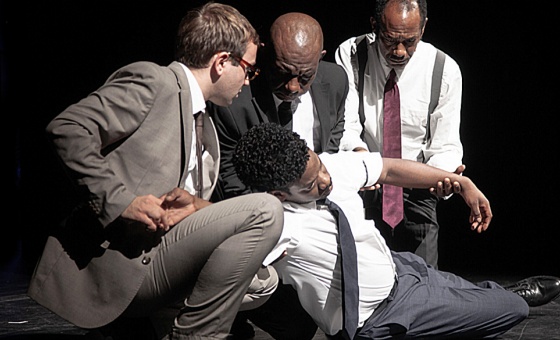This is the last article you can read this month
You can read more article this month
You can read more articles this month
Sorry your limit is up for this month
Reset on:
Please help support the Morning Star by subscribing here
MORE than 5,600 people were reported killed in Haiti last year as a UN-backed mission led by Kenya struggles to contain rampant gang violence, officials said on Tuesday.
The number of killings increased by more than 20 per cent compared with all of 2023, according to the UN Human Rights Office. In addition, more than 2,200 people were reported injured and nearly 1,500 kidnapped, it said.
“These figures alone cannot capture the absolute horrors being perpetrated in Haiti, but they show the unremitting violence to which people are being subjected,” UN high commissioner for human rights Volker Turk said in a statement.
Among the victims are two journalists and a police officer killed when gunmen opened fire on a crowd that gathered on Christmas Eve for the much-anticipated reopening of Haiti’s biggest public hospital, which gangs forcibly closed earlier this year.
Overall, gang violence has left more than 700,000 Haitians homeless in recent years, with many crowding into makeshift and unsanitary shelters after gunmen razed their homes.
“I saw family members being murdered, and there was nothing I could do to save them,” recalled Garry Joseph, 55, who now lives in an abandoned government office with hundreds of others who fled their neighbourhoods.
“Everybody was running for their lives the night we had to leave.”
Last year’s victims include more than 200 people killed in early December in a gang-controlled slum, many of them older Haitians, after a gang leader sought to avenge his son’s death following Vodou rituals, according to the UN. It was one of the biggest massacres reported in Port-au-Prince in recent history.
“It’s time for them to die,” said Anita Jean-Marie of the gang members. “They’ve made people’s lives unbearable.”
The 49-year-old mother of two boys lives in an overcrowded shelter after gangs chased them out of their home: “We don’t know what they’re fighting over.”
Among those killed last year are 315 suspected gang members or people associated with them, who were lynched, and more than 280 people killed by police in alleged summary executions, the UN said.
“It has long been clear that impunity for human rights violations and abuses, as well as corruption, remain prevalent in Haiti,” Mr Turk said.
He called for more logistical and financial support for the UN-backed mission that began in early June as the US and other countries called for a UN peacekeeping mission.
About 400 police officers from Kenya are leading the mission and were joined days ago by some 150 military police officers from Central America, the majority from Guatemala.
Jamaica, Bahamas and Belize have sent a handful of personnel, while other nations including Barbados, Bangladesh and Chad have pledged to do the same, but it isn’t clear when they would be deployed.
The number remains far below the 2,500 officers expected for the mission.
As violence keeps surging, Mr Turk called on all nations to halt deportations to Haiti.
“The acute insecurity and resulting human rights crisis in the country simply do not allow for the safe, dignified and sustainable return of Haitians. And yet deportations are continuing” he said.
Under the administration of US President Joe Biden, some 27,800 Haitians were deported, according to Thomas Cartwright of Witness at the Border, an advocacy group that tracks flight data.
Meanwhile, the neighbouring Dominican Republic, which shares the island of Hispaniola with Haiti, deported more than a quarter million of people to Haiti last year as part of an ongoing crackdown on migrants.









